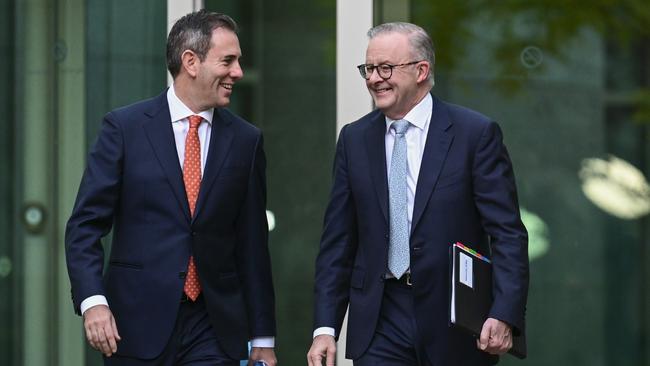Deflated voters aren’t buying Treasurer’s spin on budget
Jim Chalmers has failed to convince Australians that Labor’s first full budget since the election will reduce inflation`.

Jim Chalmers has failed to convince Australians that Labor’s first full budget since the election will reduce inflation, with only 13 per cent of voters believing the government’s claim and only a third saying the budget overall will be good for the economy.
With the political battlelines now drawn around what the Coalition has labelled the “working poor”, only 20 per cent of voters say they will be financially better off following the budget, with the centrepiece $14bn cost-of-living package aimed at easing pressure on the most vulnerable.
An exclusive post-budget Newspoll conducted for The Australian shows the budget falling short of an electoral dividend for Labor as the Treasurer embarks on a five-day blitz of five cities to spruik the cost-of-living package and the plan to make Australia a renewable energy superpower.
Instead, the Coalition has improved its position slightly, with a one-point gain in popular support to 34 per cent and a two-point contraction in Labor’s two-party-preferred lead to 55-45 per cent.
Both Anthony Albanese and Peter Dutton saw improvements to their approval ratings. On the key question of the budget’s overall impact on the economy, 33 per cent of voters believed it would be good overall. This was an improvement on last October’s budget, 29 per cent – which was the lowest level of support on this measure in more than 20 years – but was still low by historical standards.
A total of 28 per cent said it would have a negative impact on the economy.
Opinion was divided among demographic groups, with younger voters more inclined to believe the budget was good – 41 per cent of 18 to 34-year-olds – compared to just 25 per cent of 50 to 64-year-olds. Only one in five voters said they would be better off financially, with 36 per cent saying they would be worse off. This was also an improvement for the government on the October budget, which left only 12 per cent of voters saying they would be better off. Older age groups were overwhelmingly negative. Just 8 per cent of 50 to 64-year-olds believed they would be better off compared to 30 per cent of 18 to 34-year-olds. Among the over-65s, 17 per cent said they would be better off, with 23 per cent of 35 to 49-year-olds claiming the same.
The Treasurer has been forced to defend claims by economists that the budget could add to inflation and opposition attacks it would leave middle Australia worse off.
Dr Chalmers brought the budget back into surplus for the first time in 15 years aided by income tax and commodities revenue windfalls.
The centrepiece of the budget was a $14.6bn cost-of-living package, including a $40 fortnightly rise in JobSeeker and some other welfare payments. The budget also funded the $11bn in aged-care worker pay rises, as well as $3bn in energy bill relief.
Voters were unconvinced by the Treasurer’s claim the budget would have a deflationary impact, delivered primarily through the energy subsidy, with 39 per cent saying it would make inflation worse. Just 13 per cent agreed with Dr Chalmers’ assurances that it would make inflation better, with 33 per cent saying they didn’t think it would make any difference.
The views were divided along party political lines, with more Coalition voters saying it would be inflationary – 57 per cent compared to 19 per cent of Labor voters. However, only 17 per cent of Labor voters said it would have a deflationary effect as claimed by the government.
Voters more broadly did not believe, however, that the opposition would have delivered a better budget, with 35 per cent saying it would, compared to 49 per cent saying no. This was consistent with the long-term average.
Dr Chalmers has described the budget as a traditional Labor budget that sought to provide relief to the most vulnerable with responsive fiscal management which wouldn’t add to inflation.
“Our budget sees people through difficult times and sets our country up for the future,” he said on Sunday ahead of his budget “roadshow”.
“It helps Australians doing it tough and makes significant inroads in cleaning up the mess we inherited from the Coalition.
“Whether it’s our energy rebates, bulk-billing incentives or our energy efficiency package, I’ll travel right across Australia this week – including from Brisbane to Bennelong, and South Australia to Swan – to explain the broad-based benefits that our budget delivers.”
Opposition Treasury spokesman Angus Taylor said inflation was now being driven by “Canberra, not the Kremlin” in reference to the easing of global energy and supply chain pressures triggered by Russia’s war on Ukraine. “It’s hard to find the economists who think that this budget is putting downward pressure on inflation,” he told Sky News. “There’s a debate about whether it’s waiting and making it worse or it’s neutral.”
The budget failed to produce an electoral lift for Labor, with its primary vote of 38 per cent unchanged since the last poll in April. The Coalition lifted a point to 34 per cent while the Greens remained stable at 11 per cent and Pauline Hanson’s One Nation unchanged on 7 per cent.
Both leaders enjoyed a lift in approval ratings with Mr Albanese’s satisfaction level rising four points to 57 per cent while Mr Dutton’s recorded a three-point rise to 36 per cent.
In the head-to-head contest, Mr Albanese improved two points to 56 per cent while his rival Mr Dutton lifted a point to 29 per cent.







To join the conversation, please log in. Don't have an account? Register
Join the conversation, you are commenting as Logout